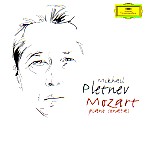If you set out to record vulgar, perverse, and self-serving Mozart piano interpretations, at least be fun, or entertain, like Glenn Gould did. Unfortunately, Mikhail Pletnev doles out the interpretive graffiti in sober, heavily calculated scoops. In nearly every selection Pletnev exaggerates ritards at the ends of sections or else underlines transitional upbeats and pickups into new sections in a manner that not only belabors the obvious but also grows increasingly old and predictable. His mincingly detached articulation in the C major K. 330 sonata transforms the music into an animated cartoon, but not a humorous one. Conversely, Pletnev’s delicate colorations and tapered phrasings trivialize the C minor K. 457 sonata’s inherent drama and sweep, while tempo gearshifts in the F major K. 332 sonata first movement undermine Mozart’s subtle cross-rhythmic ideas. And why does Pletnev underplay and scale down the finale’s upbeat scintillation? What’s he trying to prove? It’s easy to be impressed by how Pletnev subjects the Turkish Rondo’s thematic repetitions to varied dynamic specifications, but after two or three more hearings, you’re on to the pianist’s little tricks. The moral of this release: artifice without passion is a sure-fire recipe for interpretive obsolescence. [5/22/2006]
































